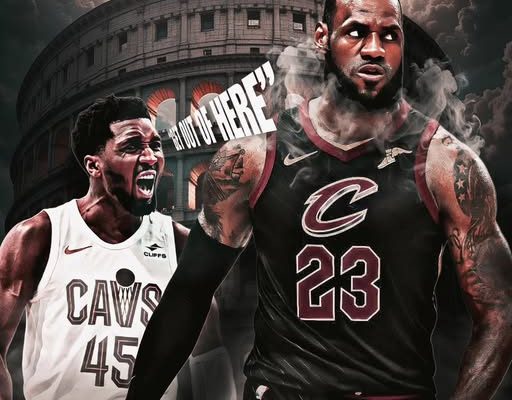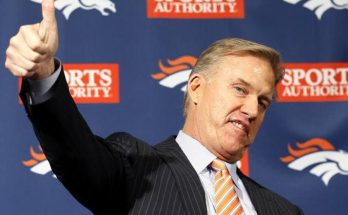The Cleveland Cavaliers and LeBron James share one of the most storied relationships in modern NBA history, marked by dramatic highs, painful lows, and a championship that ended a 52-year title drought for the city of Cleveland. Yet, as the basketball world speculates about the possibility of LeBron’s career coming full circle with a return to his hometown team, reports suggest that the Cavaliers are not particularly interested in reigniting the partnership. This revelation, while surprising to some, speaks volumes about the franchise’s current trajectory, its long-term vision, and its commitment to building a sustainable future rather than leaning on nostalgia. With LeBron nearing the twilight of his career, the Cavaliers’ lack of enthusiasm is a statement about where they believe they are heading as a young, competitive team in the Eastern Conference.
LeBron James remains one of the NBA’s most influential figures, both on and off the court. At 40 years old, his ability to play at an elite level is nothing short of remarkable, and he continues to defy the aging curve with his combination of skill, intelligence, and physical conditioning. However, the Cavaliers’ current core, led by Donovan Mitchell, Darius Garland, Evan Mobley, and Jarrett Allen, is built around youth and the potential for long-term growth. Adding a veteran like LeBron—while still enticing from a marketing and leadership standpoint—may not align with the team’s plans to continue developing its younger stars and solidifying a team identity that isn’t overly dependent on a single player.
One of the primary reasons the Cavaliers may not be pursuing LeBron aggressively is the fit issue. While LeBron can undoubtedly elevate any team’s floor and ceiling, the Cavaliers are in a phase where they are trying to establish consistent chemistry and balance among their young players. Mitchell’s offensive prowess, Garland’s playmaking, and Mobley’s defensive versatility create a dynamic foundation that the team is invested in. Bringing LeBron back could disrupt the current hierarchy and force the team to recalibrate its style of play to accommodate a ball-dominant superstar. This is not necessarily a negative, but it could slow the development of players like Garland or Mobley, who need the ball in their hands to flourish.
Furthermore, there’s the financial aspect to consider. LeBron James commands a significant salary, and while the Cavaliers could theoretically create room or explore sign-and-trade options, the cost could be steep. The team would have to weigh the immediate benefits of a LeBron reunion—such as increased championship odds and heightened media attention—against the long-term implications of tying up cap space and potentially losing young assets in the process. The Cavaliers have worked hard to assemble a balanced roster, and mortgaging future flexibility for what could be only a short-term stint with LeBron may not align with their philosophy.
Another angle is the simple reality of time. LeBron’s career, though still producing incredible moments, is approaching its end. The Cavaliers, in contrast, are looking at a multi-year window with their young core entering their prime years. Donovan Mitchell’s future with the franchise is already a topic of speculation, with the star guard eligible for a contract extension. The front office may be more focused on building a team that convinces Mitchell to stay long-term rather than bringing in a player whose presence, while legendary, could shift the focus away from the collective growth of the roster.
From LeBron’s perspective, a return to Cleveland would certainly be an emotional and narrative-driven move. He has spoken fondly about his home state and the legacy he built during his time with the Cavaliers, especially his heroic performance during the 2016 NBA Finals. Yet, it is worth considering whether he would want to join a team where he isn’t necessarily the center of attention or the focal point of the offense. While LeBron has shown an ability to adapt to different roles, such as playing alongside Anthony Davis with the Lakers, a return to Cleveland would likely mean stepping into a team that is not constructed around his strengths in the same way it was during his prime years.
The Cavaliers’ apparent lack of interest does not diminish the respect or gratitude they have for LeBron’s contributions to the franchise. His impact on the city of Cleveland and the organization is immeasurable, from revitalizing the team’s relevance to delivering its first NBA championship. However, the front office, led by general manager Koby Altman, seems intent on forging a path that is forward-looking rather than backward-facing. This is a common theme among NBA teams that have gone through rebuilds and emerged with young, promising rosters—they often prioritize continuity and chemistry over nostalgia-driven reunions, no matter how enticing they might seem.
There’s also the competitive landscape of the Eastern Conference to consider. Teams like the Boston Celtics, Milwaukee Bucks, and Philadelphia 76ers are currently at the top, with rosters built to win now. The Cavaliers have been positioning themselves to be in that conversation, and their focus on developing players like Evan Mobley into a potential franchise cornerstone is central to that plan. Mobley, in particular, represents the future of the team’s frontcourt, and his growth trajectory could be altered if the offense suddenly shifts to accommodate a veteran like LeBron. While playing alongside an all-time great could benefit Mobley in terms of learning and experience, the organization may prefer to let him evolve naturally in a system built for his strengths.
There’s also the possibility that this reported lack of interest is a negotiation tactic or simply part of the natural ebb and flow of rumors. The NBA is notorious for smoke screens and posturing when it comes to big-name players. It is possible that the Cavaliers are keeping their cards close to their chest, not wanting to publicly show interest and raise expectations. Alternatively, they could be signaling to LeBron and his camp that any potential reunion would need to come on the team’s terms, not his. In the past, LeBron has wielded significant influence over the roster decisions of teams he’s played for, and the Cavaliers might be hesitant to return to that dynamic now that they’ve established a clear organizational identity.
For Cavaliers fans, the notion of not pursuing LeBron might be bittersweet. On one hand, seeing him return for a final run could bring excitement and nostalgia, especially given how beloved he remains in Ohio. On the other hand, many fans recognize that the team’s future lies with its current core, and bringing back LeBron could derail the progress they’ve made since his departure in 2018. The team’s performance in the playoffs will likely dictate how aggressively they pursue external moves in the coming seasons. If they fall short of expectations, perhaps the front office might reconsider a veteran addition like LeBron. But as things stand now, the emphasis is on continuity, player development, and fine-tuning the roster for long-term success.
LeBron’s legacy in Cleveland is secure regardless of whether he returns or not. His decision to come back in 2014 and lead the Cavaliers to a historic championship was a defining moment not only for his career but for the franchise as well. The iconic image of LeBron’s block on Andre Iguodala in Game 7 of the 2016 Finals is forever etched in NBA history. The Cavaliers do not need another reunion to validate what he has already accomplished with them, and perhaps that is part of why they feel no urgency to bring him back now.
Looking forward, the Cavaliers are in a unique position. They have a roster that can compete in the East while also having the potential to improve internally as their young stars gain experience. Players like Garland and Mobley could take significant leaps in the coming seasons, and Mitchell’s prime years are still ahead of him. Adding a veteran of LeBron’s caliber could boost their chances of making a deep playoff run in the short term, but it could also shift the team’s long-term trajectory in ways that the front office may not be comfortable with.
Ultimately, the reported lack of interest from the Cavaliers is not so much a rejection of LeBron as it is a reflection of their confidence in the path they are currently on. While a reunion would be a headline-grabbing move and a sentimental favorite, the NBA is a league that constantly evolves. Teams must make decisions based on what will put them in the best position to succeed not just today, but for years to come. For the Cavaliers, that means betting on their young core and continuing to build around a foundation that they believe can sustain success even after LeBron James has retired.
If the day comes when LeBron does want a final farewell in Cleveland, it is possible that the door will still be open, even if only slightly. His connection to the franchise and the city is too strong to completely dismiss. However, as of now, the Cavaliers seem content to let the past remain in the past while focusing on the future. Whether this strategy will pay off in terms of championships remains to be seen, but it is clear that the organization is prioritizing its own growth over the allure of a reunion with its most iconic player.



